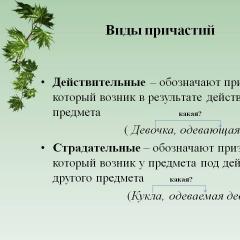Combators: examples of words in Russian
Russian is rich in a large number of different parts of speech that help build competent and logical text. But it is impossible to present our native speech without communion, forms of verb, which contain both signs and adjectives. Communion is a synthesized part of speech, which has a large number of expressive opportunities, can perform different functions in the proposal. It is necessarily studied in the course of the school program.
First of all, it is necessary to give a definition of communion as part of speech. Communion is called a verb form that combines signs of the name of the adjective and verb and answering questions what? which the? Communion characterizes the action and its sign at the same time. So briefly can be explained what communion is. Examples of words belonging to this part of speech is the leading, screaming, who knows, who has lived, readable and many others.
Since the communion is inseparable from the adjective, they have some general signs. So, the communities may vary by numbers, birth and case. It is important to note that these features possess both short and complete communities. Examples of words with these features bringing them closer to adjectives: dreaming - dreaming (change by childbirth), recognizing - recognized (the only and multiple number), compiled - compiled - drawn up (change by cases of cases: nominative, pet and dative, respectively).
Signs of verb in communion
Since the communion is one of the forms of verb, these two parts of the speech are closely interrelated and have a set of common features. They should be noted among them (perfect - said, imperfect - speaking), repayment and non-return (laughing, removed), pledge (suffering - prepared, valid - aging). Transaction and incompetence - this is another sign that is characterized by the sacrament. Examples of words that belong to the transition is cleaner (room), reading (newspaper), to uncomplicated - still, inspired.

Special item is the presence of time. It is necessary to remember that this part of speech is only the past and present. The communities do not have a form of a future time.
Valid communion
This group of communities calls the action that the object itself performs. But what is in practice a valid communion? Examples of the words of this discharge is a frightening, whispering, who has lived, shouting, flying, etc.
In the proposal, the actual sacrament describes the action that develops simultaneously with the one that calls the faugible (for example: a mother is watching a playing child).

Special situation with valid periods of past time. What action describes a specific communion can be judged after determining the type of verb, from which it is formed. So, if the actual communion is formed with the help of the corresponding suffixes from the verb of the perfect species, the action happened before the vern called the verb. For example, a student sits in the class who solved the test work. The communion is formed from the verb to "decide" (what to do?) - perfect species. The class is sitting a student, decisive testing. In this case, the proposal uses an imperfect sight.
Padding communities
Another variety of this part of speech is the suffering communities. Examples of words belonging to this category may be as follows: Created, purchased, dressed, built-in, slave, etc.
This species of communities describes the action that is performed above the object. In turn, the process that comes the communion can occur both at the same time as which says to the lean and end earlier, nevertheless there is a connection with the present moment.
Very often in speech, and in the literature you can find a suffering party with a dependent word. Examples of such phrases: a piece written by the composer, listened with Meloman music track, etc.
Communication with other parts of speech
Communion can be transformed into other parts of speech under the influence of various processes that promote the development of the Russian language. So, the communion can be substantivate in a noun (it is necessary to pay attention to such words as the commander, the future that answer questions who?and what?).

Another important concept is the adactness adactness. Examples of words that have been exposed to this process are fried, mature, intimate, inborn, etc. There is a completely logical question: how to distinguish the sacrament from the adjective in each particular case? One of the main signs that will help split these parts of speech is to find the sacrament with a dependent word. Examples of such words: frying potatoes, causing indignation of the deed and so on.
Passing of communion in the topic "Morphology"
In the course of studying each part of speech both in the school program and in the curriculum of any philological faculty there are tasks for the analysis of one or another word in the proposal. To do this, it is necessary to determine the part of the speech to which this lexical unit belongs, and competently analyze. So, let's try to disassemble the communion. How to determine what the word is the representative of this part of speech? You just need to know typical swing suffixes. Examples of words containing suffixes -the, which (participating, thirsty), is, -the- (hurrying, sleeping), -This- (became), -t- (deceived), -nn-, -n - (built-in, recognized), -th-, --- (adorable, led), - all these are communion, valid and persistent, past or present.

So, the analysis of the communion consists of a substitution to him (most often what?), Identifying it as communion, instructions of the initial form of a male genus, the only number in the nominative case, the definition of the verb and suffix, with which it is formed from it. It is also necessary to indicate the species, the availability of repayment and transition, pledge, time, form (brief or complete), kind, numbers, case, and declining, the syntactic role in this particular offer.


